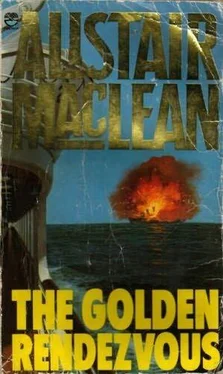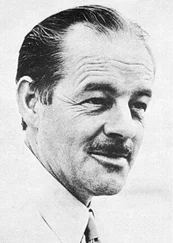“He saw too much.” I kneeled beside him, examined the back and sides of his neck. No marks there at all. I looked up and said, “Can I turn him over, sir?”
“It can’t do any harm now.” Bullen’s normally ruddy face had lost some colour and the lips were clamped in a thin hard line.
I heaved and pulled for a few seconds and managed to get Dexter more or less turned over, half on his shoulders and half on his back. I didn’t waste time checking his breathing or his pulse; when you’ve been shot three times through the middle of the body the breathing and pulse are things of the past. And Dexter’s white uniform shirt, with the three small powder-blackened blood-tinged holes just beneath the breastbone, showed indeed that he had been shot three times: the area covering those holes could have been blotted out by a playing card.
Somebody had made very sure indeed. I rose to my feet, looked from the captain to the bo’sun, then said to Bullen, “We can’t pass this off as a heart attack, sir.”
“They shot him three times,” Bullen said matter-of-factly. “We’re up against someone in the maniac class, sir.” I stared down at Dexter, unable to look away from the face, racked and twisted by his last conscious moment of life, that fleeting moment of tearing agony that had opened the door to death. “Any one of those bullets would have killed him. But whoever killed him killed him three times, someone who likes pressing a trigger, someone who likes seeing bullets thud into a human being, even although that human being is dead already.”
“You seem very cool about this, mister.” Bullen was looking at me with a strange look in his eyes.
“Sure I’m cool.” I showed Bullen my gun. “Show me the man who did this and I’ll give him what he gave Dexter. Exactly the same and to hell with Captain Bullen and the laws of the land. That’s how cool I am.”
“I’m sorry, Johnny.” Then his voice hardened again. “Nobody heard anything. How did nobody hear anything?”
“He had his gun close up to Dexter, maybe jammed right against him. You can see the marks of burnt powder. That would help to deaden the sound. Besides, everything points to this person — those persons — as being professionals. They would have silencers on their guns.”
“I see.” Bullen turned to Macdonald. “Could you get Peters here, bo’sun? At once.”
“Aye, aye, sir.” Macdonald turned to leave, and I said quickly, “Sir, a word before Macdonald goes.”
“What is it?” His voice was hard, impatient. “You’re going to send a message?”
“Too right I’m going to send a message. I’m going to ask for a couple of fast patrol boats to be sent out here to meet us. At the speed those gas turbine jobs can go they’ll be alongside before noon. And when I tell them I’ve had three men murdered in twelve hours, they’ll come running. I’ve had enough of playing it smart, first. This fake burial to lull their suspicions this morning, to make them think we’ve got rid of the only evidence of murder against them. See where it’s got us? Another man murdered.”
“It’s no use, sir. It’s too late now.”
“What do you mean?”
“He didn’t even bother to replace the lid after he left, sir.”
I nodded towards the big transmitter-receiver, with its metal lid slightly askew, the securing screws loose. “Maybe he was in a hurry to get away, maybe he just knew there was no point in securing it anyway; we were bound to find it out sooner or later and sooner rather than later.” I lifted the lid and stood to one side to let Bullen look also.
Nothing was ever surer than that no one would ever use that transmitter again. It was littered inside with torn wire, bent metal, smashed condensers and valves. Someone had used a hammer. There was no guesswork about that: the hammer was still lying among the tangled splintered wreckage that was all that was left of the once complicated innards of the transmitter. I replaced the lid. “There’s an emergency set,” Bullen said hoarsely. “In the cupboard under the table there. The one with the petrol generator. He’ll have missed that.” But the murderer hadn’t missed it; he wasn’t the type to miss anything. And be certainly hadn’t missed with that hammer. If anything, he’d done an even more thorough job on the emergency set than on the main set, and, just for good measure, he’d smashed up the armature of the petrol generator.
“Our friend must have been listening in on his receiver again,” Macdonald put in quietly. “So he came out either to stop the message or smash up the sets, so that no more messages could come through. He was lucky; had he been a bit later and the radio officer back on watch, my men would have been holystoning the decks outside and there would have been nothing he would be able to do.”
“I don’t associate luck with this killer in any way,” I said.
“He’s too damned efficient for that. I don’t think any more messages which might have worried him had come through, but he was afraid they might. He knew both Peters and Jenkins were off watch at the burial, and he probably checked that the wireless office was locked. So he waited till the coast was clear, came out on deck, unlocked the office, and went inside. And Dexter, unfortunately for himself, saw him going in.”
“The key, mister,” Bullen said harshly. “The key. How come?”
“The Marconi man in Kingston who checked the sets, sir. Remember?” He remembered all right: the Marconi man had telephoned the ship, asking if servicing facilities were required, and Bullen had seized on it as a heaven-sent opportunity to close down the radio office and refuse to accept any more embarrassing and infuriating messages from London and New York. “He spent about four hours there. Time to do anything. If he was a Marconi man, I’m the queen of the may. He had a nice big impressive tool kit with him, but the only tool he used, if you could call it that, was a stick of wax, heated to the right temperature, to take an impression of the Yale even if he had managed to pinch the Yale and return it unseen it would have been impossible to cut a new one; those special Yales are far too complicated. And my guess is that that was all he did while he was there.”
And my guess was completely wrong. But the thought that this fake Marconi man might have employed himself in another way during his stay in the wireless office did not occur to me until many hours later: it was so blindingly obvious that I missed it altogether, although two minutes constructive thought would have been bound to put me on to it. But hours were to elapse before I got round to the constructive thought, and by that time it was too late. Too late for the Campari, too late for its passengers, and far, far too late for all too many of the crew.
We left young Dexter lying in the wireless office and secured the door with a new padlock. We’d talked for almost five minutes about the problem of where to put him before the simple solution occurred to us: leave him where he was. Nobody was going to use that wireless office any more that day; he was as well there as anywhere till the Nassau police came aboard.
From the wireless office we’d gone straight to the telegraph lounge. The teleprinters in there were coupled to receiver transmitters on fixed wavelengths to London, Paris, and New York but could be adapted by men who knew what they were doing, such as Peters and Jenkins, to receive and transmit on practically any wavelength. But not even Peters and Jenkins could do anything about the situation we found: there were two big transmitters in the telegraph lounge, cleverly designed to look like cocktail cabinets, and both had received the same treatment as the sets in the wireless office: the exteriors intact, the interiors smashed beyond repair. Somebody had been very busy during the night: the wireless office must have been the last item on his list.
Читать дальше
Конец ознакомительного отрывка
Купить книгу












